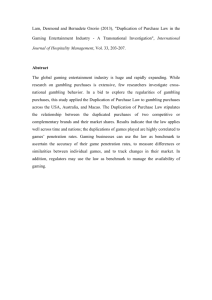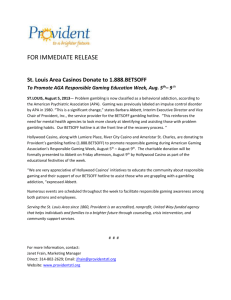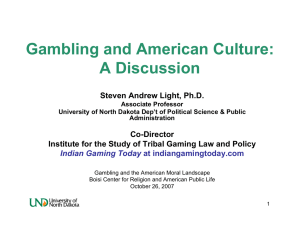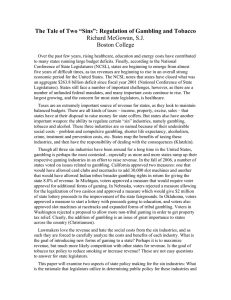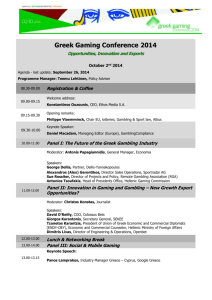Document 13395698
advertisement
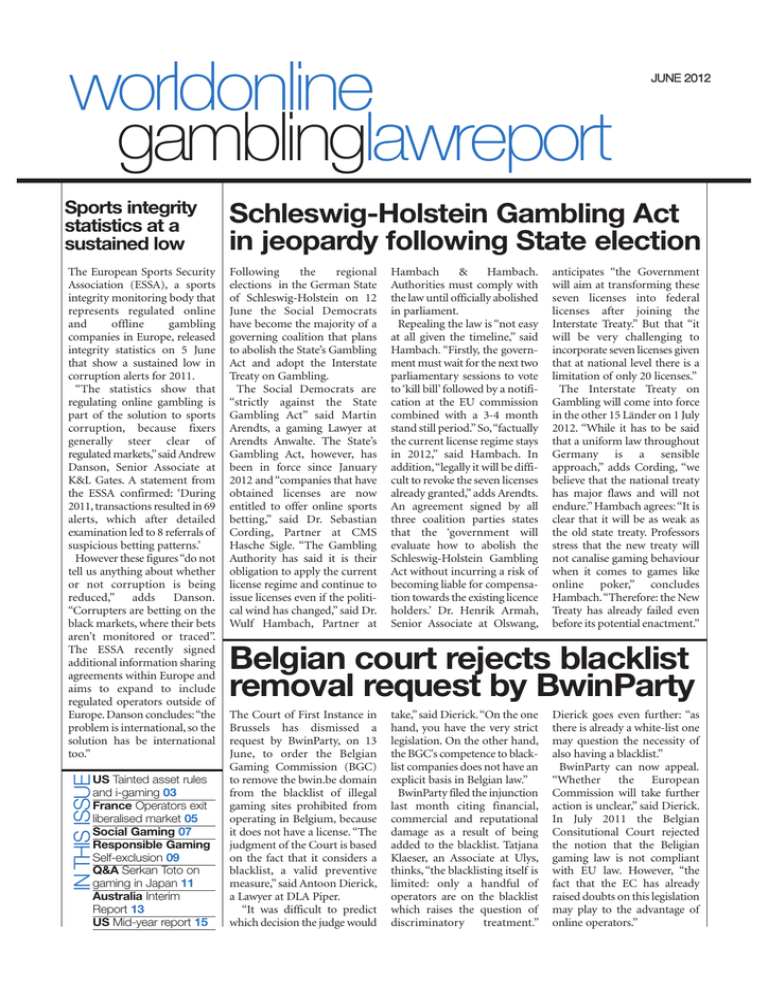
ïçêäÇçåäáåÉ Ö~ãÄäáåÖä~ïêÉéçêí JUNE 2012 Sports integrity statistics at a sustained low Schleswig-Holstein Gambling Act in jeopardy following State election The European Sports Security Association (ESSA), a sports integrity monitoring body that represents regulated online and offline gambling companies in Europe, released integrity statistics on 5 June that show a sustained low in corruption alerts for 2011. “The statistics show that regulating online gambling is part of the solution to sports corruption, because fixers generally steer clear of regulated markets,”said Andrew Danson, Senior Associate at K&L Gates. A statement from the ESSA confirmed: ‘During 2011, transactions resulted in 69 alerts, which after detailed examination led to 8 referrals of suspicious betting patterns.’ However these figures “do not tell us anything about whether or not corruption is being reduced,” adds Danson. “Corrupters are betting on the black markets, where their bets aren't monitored or traced”. The ESSA recently signed additional information sharing agreements within Europe and aims to expand to include regulated operators outside of Europe. Danson concludes:“the problem is international, so the solution has be international too.” Following the regional elections in the German State of Schleswig-Holstein on 12 June the Social Democrats have become the majority of a governing coalition that plans to abolish the State’s Gambling Act and adopt the Interstate Treaty on Gambling. The Social Democrats are “strictly against the State Gambling Act” said Martin Arendts, a gaming Lawyer at Arendts Anwalte. The State’s Gambling Act, however, has been in force since January 2012 and “companies that have obtained licenses are now entitled to offer online sports betting,” said Dr. Sebastian Cording, Partner at CMS Hasche Sigle. “The Gambling Authority has said it is their obligation to apply the current license regime and continue to issue licenses even if the political wind has changed,” said Dr. Wulf Hambach, Partner at IN THIS ISSUE US Tainted asset rules and i-gaming 03 France Operators exit liberalised market 05 Social Gaming 07 Responsible Gaming Self-exclusion 09 Q&A Serkan Toto on gaming in Japan 11 Australia Interim Report 13 US Mid-year report 15 Hambach & Hambach. Authorities must comply with the law until officially abolished in parliament. Repealing the law is “not easy at all given the timeline,” said Hambach. “Firstly, the government must wait for the next two parliamentary sessions to vote to ‘kill bill’ followed by a notification at the EU commission combined with a 3-4 month stand still period.” So,“factually the current license regime stays in 2012,” said Hambach. In addition,“legally it will be difficult to revoke the seven licenses already granted,” adds Arendts. An agreement signed by all three coalition parties states that the ‘government will evaluate how to abolish the Schleswig-Holstein Gambling Act without incurring a risk of becoming liable for compensation towards the existing licence holders.’ Dr. Henrik Armah, Senior Associate at Olswang, anticipates “the Government will aim at transforming these seven licenses into federal licenses after joining the Interstate Treaty.” But that “it will be very challenging to incorporate seven licenses given that at national level there is a limitation of only 20 licenses.” The Interstate Treaty on Gambling will come into force in the other 15 Länder on 1 July 2012. “While it has to be said that a uniform law throughout Germany is a sensible approach,” adds Cording, “we believe that the national treaty has major flaws and will not endure.” Hambach agrees: “It is clear that it will be as weak as the old state treaty. Professors stress that the new treaty will not canalise gaming behaviour when it comes to games like online poker,” concludes Hambach.“Therefore: the New Treaty has already failed even before its potential enactment.” Belgian court rejects blacklist removal request by BwinParty The Court of First Instance in Brussels has dismissed a request by BwinParty, on 13 June, to order the Belgian Gaming Commission (BGC) to remove the bwin.be domain from the blacklist of illegal gaming sites prohibited from operating in Belgium, because it does not have a license. “The judgment of the Court is based on the fact that it considers a blacklist, a valid preventive measure,” said Antoon Dierick, a Lawyer at DLA Piper. “It was difficult to predict which decision the judge would take,” said Dierick.“On the one hand, you have the very strict legislation. On the other hand, the BGC's competence to blacklist companies does not have an explicit basis in Belgian law.” BwinParty filed the injunction last month citing financial, commercial and reputational damage as a result of being added to the blacklist. Tatjana Klaeser, an Associate at Ulys, thinks, “the blacklisting itself is limited: only a handful of operators are on the blacklist which raises the question of discriminatory treatment.” Dierick goes even further: “as there is already a white-list one may question the necessity of also having a blacklist.” BwinParty can now appeal. “Whether the European Commission will take further action is unclear,” said Dierick. In July 2011 the Belgian Consitutional Court rejected the notion that the Beligian gaming law is not compliant with EU law. However, “the fact that the EC has already raised doubts on this legislation may play to the advantage of online operators.”
